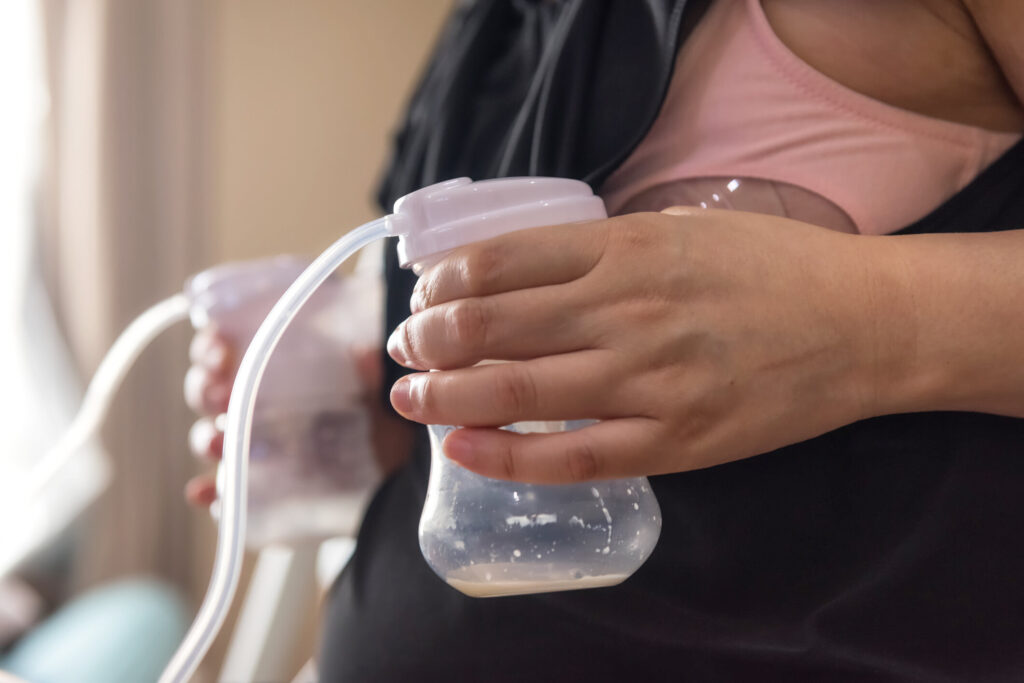
Providing milk for your baby is a great way to stay connected during the day and continue to give your baby a healthy start in life. Time away from your baby may mean that you need time to express milk.
Here are a few practical tips:
- Make sure to keep an extra set of pump supplies at your desk or somewhere at your work place because you will forget something one day.
- Keep Gallon zip loc bags handy, you can store used pump parts in the fridge after each pump session at work, to avoid having to wash them out after each session
- Consider purchasing a hands free bra to be able to continue doing work if you desire to do so.
- Talk to your coworkers about using a mini fridge or a fridge on your floor to store your milk (you can store your milk in your carrying bag if you don’t feel comfortable leaving it out in plain sight).
- Keep a small ice pack with your milk to keep it cool during your transit home.
- If you have an office, consider putting a sign on your door during your pump sessions to prevent being interrupted
- Advocate for yourself and the time you need in your schedule to pump.
Pumping at Work and Your Rights
You may have rights as a breastfeeding employee that requires your employer to provide break time and a private place to pump breast milk during the workday (the 2010 federal “Break Time for Nursing Mothers” law). Sadly, not all employment positions are covered. Talking with your supervisor and human resources team, or having trusted coworker do that for you, can help to ensure you are given the time needed to pump in a clean, private space. You deserve respect and dignity.
So, who IS covered under the law?
Fair Labor Standards Act (FLSA) establishes minimum wage, overtime pay, recordkeeping, and child labor standards affecting full-time and part-time workers in the private sector and in federal, state, and local governments. The FLSA contains some exemptions from these basic standards. Some exceptions of breastfeeding protections apply to specific types of businesses; others apply to specific kinds of work. Employers with fewer than 50 employees are not subject to the FLSA break time requirement if compliance with the provision would impose an under hardship. (Source and details).
TIME: If you ARE covered under the law, your employer must provide a “reasonable break time” to express milk each time you need to during the day. Talk with your supervisor or human resources team about what that may look like. For many women, it means pumping every few hours. You should be allowed time to gather, clean, and store your breastfeeding supplies as well.
SPACE: The law requires that you have a private space – which is NOT a bathroom – that is designated for you to pump. It may not be a dedicated lactation room per se, but it needs to be somewhere that is clean and that coworkers won’t intrude.
PAY: The time you spend expressing milk or breast-pumping isn’t necessarily paid UNLESS you have coworkers who also get paid breaks. This is an example of information that should be provided for you or it might be a question you pose for your human resources department or employee handbook.
If you aren’t sure if you’re covered or what rights you have, check here. We have a long way to go as a country to support new mothers, including in the workforce.
You may also be interested in the campaign #IPumpedHere, to see some of the places mothers have had pumped because of the lack of support.
Resources for understanding your rights:
- The U.S. Department of Labor’s Wage and Hour Division (WHD) is responsible for enforcing the “Break Time for Nursing Mothers” law. For help, call the toll-free WHD number 1-800-487-9243. You will then be directed to your nearest WHD office for assistance. The law applies to nonexempt (hourly) employees covered by the Fair Labor Standards Act.
- There are workplace protections for pregnant women and parents: A Better Balance’s Babygate website.
- Find out if you are entitled to a work accommodation, leave, and/or pumping breaks at Pregnant@Work.
- Have questions? Contact the Center for WorkLife Law’s free legal support: Email hotline@worklifelaw.org or call (415) 703-8276. This is a national hotline to support employees about parenting needs and protections, including names of lawyers in each state.
- Federal Pregnancy Discrimination Act requires employers provide breast-pumping employees with time and space to address lactation-related needs. View your state’s laws.
- Not sure how to pump with your line of work? Supporting Nursing Moms At Work: Employer Solutions is an industry-specific guide that can help you find or create a safe, clean, environment to pump.
Resources to Explore:





